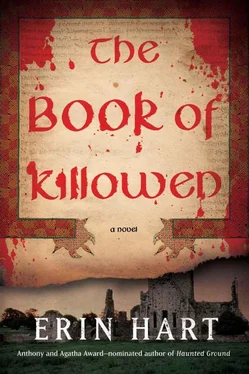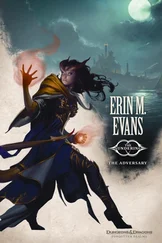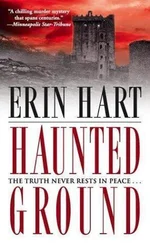The slight smirk that lit up Claffey’s face said he was pleased for having won—this round, anyway. He turned away and started rooting through a cardboard box that sat beside the door, pawing through its contents until he came up with a sturdy padlock.
He followed her out to the yard, and as Stella executed a slow three-point turn in the haggard, he made a show of slipping the lock through the hasp on the shed door and fastening it securely.
Low clouds had settled over Killowen by the time Nora returned to the farm. Her first task was locating Joseph, to try to find out what had been troubling him this morning—she’d promised Cormac. The front door of the main house was wide open, but no one answered when she called. The house felt peaceful, a diffuse light from the cloudy sky leaking in through the windows out onto the courtyard garden. The sitting room and kitchen were empty, so Nora stepped into the herb garden, refreshed by the pungent whiff of oregano. As she crossed to the other wing of the house, a small movement caught her eye. Stepping through the doorway, she called out, “Hello, anyone here?”
The stillness in the air refuted another living presence. Probably just her imagination. The interior walls of this corridor were plain whitewash, perfect for displaying the work no doubt donated by resident artists: there were woodcuts, flat metal sculptures, a few abstract seascapes, and a series of elaborate calligraphy pieces.
The first room she encountered seemed to be some sort of scriptorium: beside the windows stood a couple of tall desks, angled surfaces covered in large sheets of vellum. Shelves hanging on the back wall held rolled-up parchments and jars of brightly colored pigment; a long table between the writing desks held a mortar and pestle and several clamshells with brilliant colors crusted in their cupped surfaces. A basket of eggs stood on the center table as well, along with metal rulers, white cotton gloves with the index fingers cut off, a jar of long feathers and others holding tiny brushes and sharp knives. She ran a hand over the vellum on the nearest table, struck by the anatomical quality of the medium. You could still see blemishes, fly bites, spidery veins. She remembered reading stories, at the start of her training, about ancient medical books bound in human skin.
A few samples of the writer’s art hung framed upon the walls here in the studio as well. Unlike the precise, perfect character of most calligraphy she had seen, there was a certain extra degree of expression in these pieces, a primitive spirit that came out in the arrangement of shapes and colors. The staring animal forms that inhabited the pages seemed ready to blink. She turned to read the labels on the pigments: auripigmentum, verdigris, lapis, azurite, cinnabar, yellow ochre, purpura, malachite, red lake. Some of the names hinted at far-flung origins.
Nora began to feel self-conscious, wandering through someone’s private workroom, and was about to retreat when she was stopped by the sight of a large bowl of black marble-sized spheres. She picked one up to examine it more closely. Turning the thing over in her palm, she found a tiny hole drilled in one side.
“Can I help you?” The man’s voice came from the doorway, startling her and causing the pod to fly from her palm and roll under one of the writing desks. The speaker was a tall, lean man, perhaps in his early sixties, dressed in jeans and a plain black sweater. His hair was arranged in a thick fringe above his ears, ginger going to white, and behind the smile in his blue eyes was an inquisitive expression. Nora felt flustered, caught snooping where she probably ought not to have been. When the man spoke again, his voice held no accusation. “Would I be right in guessing you must be one of our guests from the National Museum?” The rolled r and rising inflection pegged the accent as Welsh.
“Yes, sorry, Nora Gavin.”
He took her hand. “I’m Martin, Martin Gwynne.”
“Is this your studio? I didn’t mean to blunder in here. Sorry if I’m intruding.”
“Ah, no, you’re all right.” Gwynne bent down to pick up the object she had dropped. He began to play with it as he spoke. “You’re interested in illumination, are you?”
“I teach anatomy, so I’m naturally interested in calfskin, but I’m also intrigued by all the exotic pigments.” She gestured toward the shelves.
“Ah, you’re thinking of lapis lazuli—the truest blue, brought all the way from Afghanistan in the Middle Ages. But there are local sources as well. Woad grows here, as an example. Irish monks also used ground-up shellfish, charcoal, red earth.” He reached for a jar containing a yellow powder. “This one, auripigmentum, is made from the gallbladders of eels.” He enjoyed Nora’s reaction.
“Do you still use all the old pigments?”
“Well, I’ve given up on a few of the more poisonous compounds. Orpiment, for example, a beautiful golden color, is actually arsenic trisulfide, not something into which I wish to be dipping my quill. And cinnabar—Chinese red—is mercuric sulfide. I’ve managed to find suitable substitutes for some. But somehow the modern pigments are never quite as vivid.”
“I’ve always wondered, how did the monks discover all those bizarre compounds?”
“That’s a good question. It must have been a process of experimentation, I suppose. Some knowledge carried through from even more ancient cultures. And every scriptorium had its Book of Secrets, where the monks would record their recipes. Knowledge was passed down, refined along the way, as with any branch of science or alchemy.”
Nora glanced toward the illuminations in progress she’d spied earlier. “Is this your own work? It’s beautiful.”
“You’re very kind. Yes, most of it is mine, but I’ve been working with an apprentice recently, so a few are hers.” He pointed to a couple of smaller works hanging beside the door and an unfinished piece on the nearest writing desk. “Anca’s still a bit hesitant about her design, but there is a certain boldness at the back of it. The power is in her, no doubt. She just has to learn to let it out.” Martin Gwynne frowned. “At a certain point, you can’t teach people anything further. They have to make their own mark.”
As they talked, Martin Gwynne was still playing with the pod he’d picked up from the floor and was now rolling through his fingers with the deft skill of a magician.
“What do you call that?” Nora asked. “I know I’ve seen them before, but I can’t—”
“This?” Gwynne said, stopping the little orb on the flat of his palm. “It’s an oak gall, sometimes called a gallnut.”
“Of course!” Nora felt the knowledge returning.
“We get all we need in the oak wood just beyond.”
“And what do you use them for, if you don’t mind my asking?”
“For ink, of course. Grind up a few of these, add iron shavings, wine, and gum arabic, cook it all down, and voilà!” He handed her the gall and picked up a stoppered bottle of dark liquid. “You get a very serviceable black-brown ink. It was the basic everyday stuff used all through the Middle Ages, right up to the nineteenth century. Not much in favor these days. Too caustic, you see, eats right through paper. A surface like parchment is able to withstand the bite of acid.”
And all perfectly harmless, Nora thought. Unless you’d just seen a handful of these gallnuts in the mouth of a corpse.
A voice came from the doorway. “Martin, love, do you happen to—” The woman who entered stopped short when she saw Nora. She was slender to the point of gauntness, probably in her midsixties, dressed in a hand-knit linen sweater and jeans. Her hooded eyes were dark pools that called to mind a wild creature constantly on the lookout. “So sorry, my dear, I didn’t realize you were occupied.” The accent was English, a cultivated drawl that suggested private school and money.
Читать дальше












